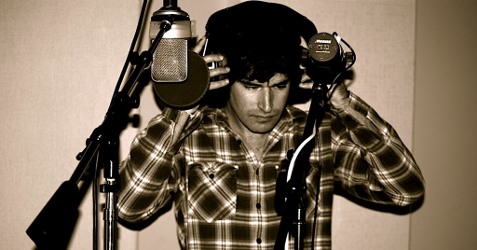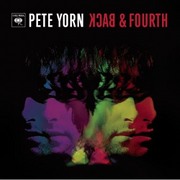- Alternative Singer/Songwriter
- 2009
- Buy the CD
Reviewed by Neil Carver
()
Every song on Musicforthemorningafter reflects back on all the strangeness ("Murray") and faithlessness ("On Your Side") and maybe or maybe not love ("Just Another") from the night before, but with the clarity of the next day’s light. Day I Forgot is the flipside, a collection of ideas that disturb, the dismissive ("Long Way Down"), sad ("Crystal Village") and sometimes silly ("Burrito"), that seem to show up in our memories, unbidden but inescapable. Even Nightcrawler, a less well received and more difficult album, brings the titled nocturnal dreams and experimentation through clearly, contemplative ("For Us"), at times insistent ("Maybe I’m Right"), and reminiscent (the brilliant cover of "Splendid Isolation").

Now Pete is back, but he seems to be heading in a very different direction. The title Back and Fourth is vague but playful in an obvious way, but it seems like a simple content label rather than a touchstone to any musical story within. As you begin to listen to the opening tracks, it takes no time at all to hear the distinctly different tone this album has compared to any previous work. Gone are the power pop chords and more aggressive, half-slurred singing, replaced by a clear emphasis on enunciation, some minimalist but intricate guitar and softer, more intimate lyrics.
In some ways, everything is lighter, mellower and generally upbeat. As most writers will tell you, though, it’s hard to create anything powerful and captivating out of a hazy sense of happiness. Opening track "Don’t Wanna Cry" is a simple, country-tinged, adult contemporary tune, and the follow-up, "Paradise Cove," wouldn’t be out of place sung by a band poolside at a beach resort of the same name. He sounds much more like himself on "Close," though lyrically he stays with tried and true clichés like "Learn to live this life / Learn to get along."
As you move through the songs, the clear divergence from his earlier work becomes clear in two distinct ways. First, there is no clear story: no time or place or drama manifests itself at any point. He takes a stab at it with the stilted and syrupy "Social Development" and its attempt to honor a relationship faded and lost, but lines like "I tried to find out what happened to you / I Googled you in quotes" are utter clunkers. Almost every other song falls into the realm of "Baby / Give me a sign / I miss you" as it is so clearly stated on "Shotgun." A good story must have a theme, but a theme of earnest pleasantness on its own does not a story make.
The second piece of his new direction is at the heart of what, in the end, doesn’t work so well on Back and Fourth. While all of his early songs worked through the classics of love, loss, estrangement, and anger, Yorn captured them from a certain, unsentimental distance that allowed him to create a unique soundscape, rich, powerful and rocking, while lyrically eclectic, offbeat and never obvious. All of Back and Fourth is drenched in sentiment, and this results in an often mundane, bland production that lacks any real edge for the listener to grasp on to. There is no heart-thumping belting of "’Cause it already is!" or tragically painted figure of "the old man in the kitchen" to pull the listener in. The music of Back and Fourth just washes past and leaves you untouched.
If Yorn is trying to make a conscious break from his original trilogy, then he has certainly accomplished that. Unfortunately, this is not an engaging or effective break. While certainly pleasant enough, old fans will likely be disappointed in the new sound, and nothing on Back and Fourth is going to cause potential new ones to take notice.
You can follow us on Twitter and Facebook for content updates. Also, sign up for our email list for weekly updates and check us out on Google+ as well.













